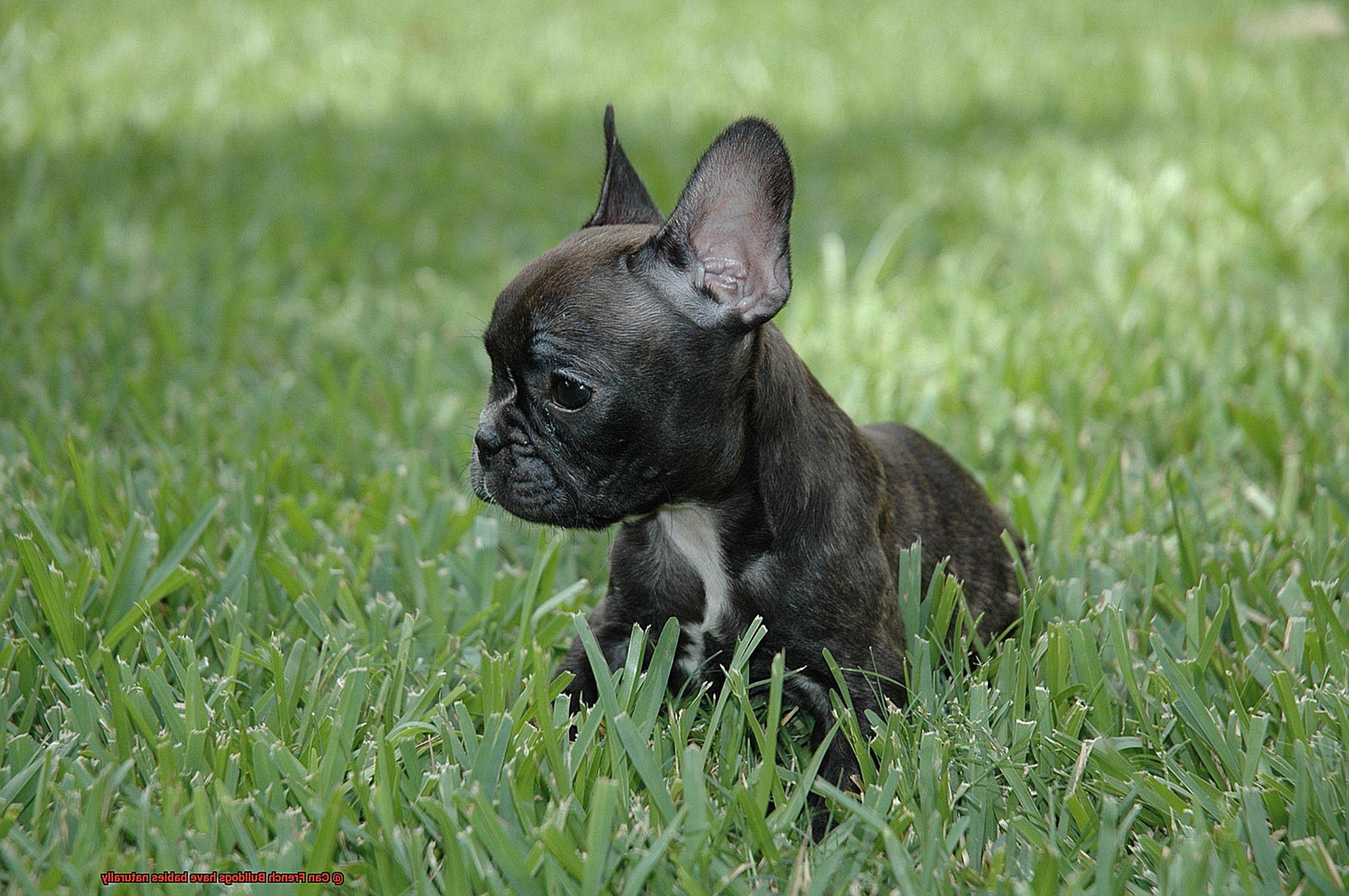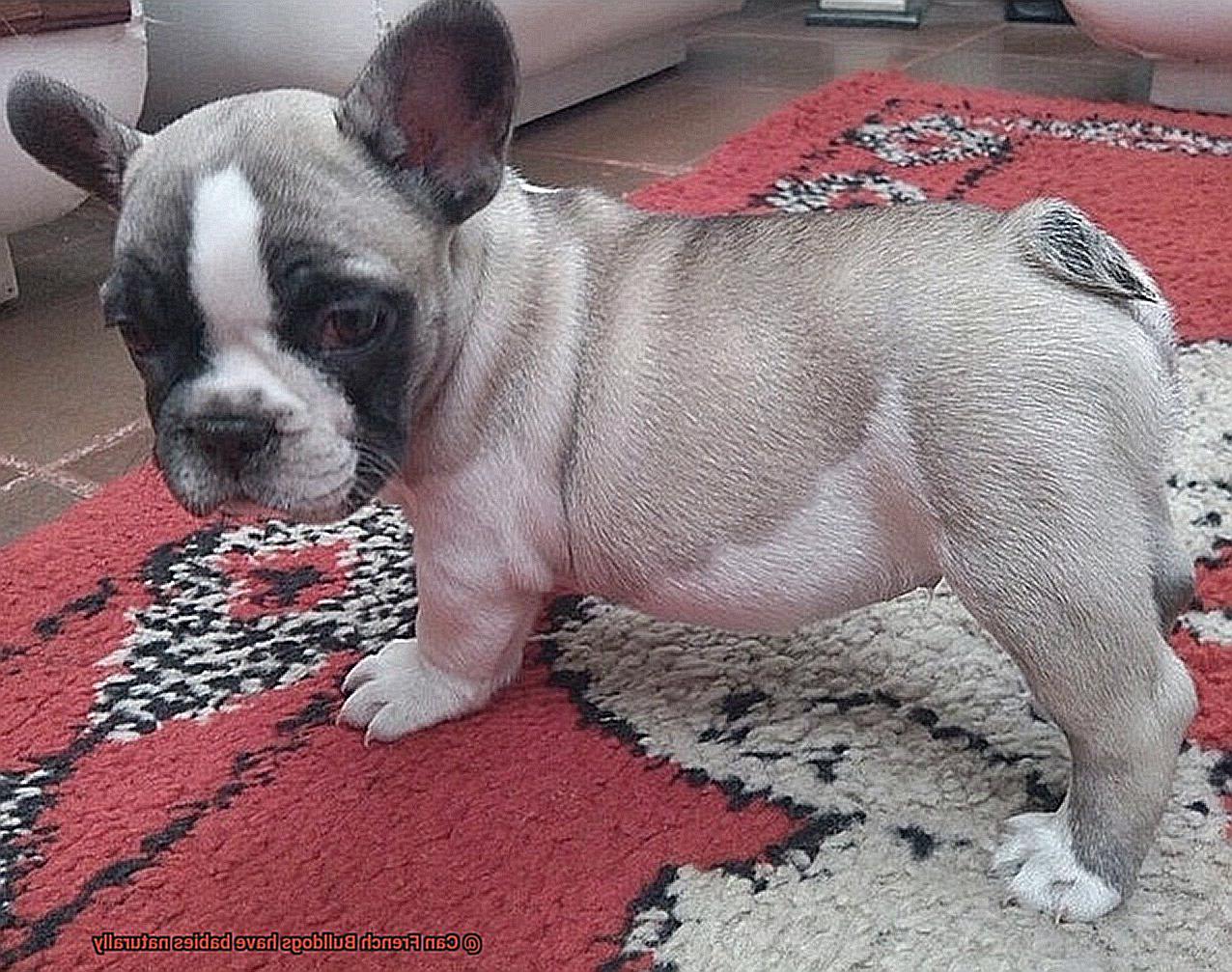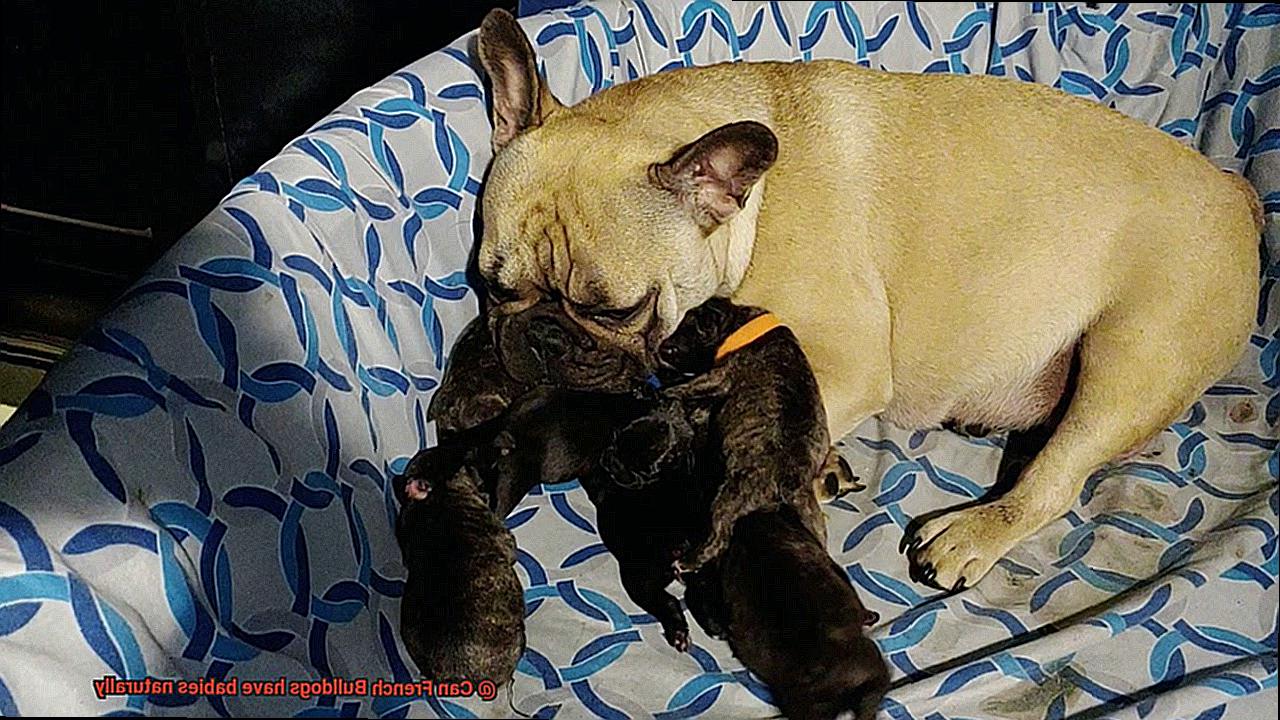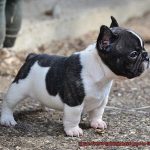Can French Bulldogs have babies naturally?
Get ready to embark on a wild ride as we tackle one burning question: Can French Bulldogs have babies naturally? Brace yourself for a deep dive into the enchanting world of these adorable bat-eared cuties.
French Bulldogs have stolen hearts all over the globe with their irresistible charm and affectionate personalities. But amidst the frenzy surrounding these pint-sized pooches, rumors have been swirling about their ability to reproduce without any human intervention.
These compact and charismatic pups boast undeniable traits that set them apart from other breeds. With their squishy faces, silky coats, and sturdy builds, they’re like little balls of irresistible magnetism. However, it’s precisely these features that raise doubts about whether French Bulldogs can conceive and deliver offspring naturally.
In this blog post, we’ll unravel the mysteries behind the natural parenthood journey of French Bulldogs. We’ll delve into their breeding history and explore how certain physical attributes might affect their reproductive capabilities. Brace yourself for some eye-opening revelations.
Now, kick back, relax, and get ready to embark on an illuminating adventure into the world of French Bulldogs. Together, we’ll separate fact from fiction and discover the truth about their innate ability to bring new furry lives into this world. Let’s dive right in.
Unique Physical Characteristics of French Bulldogs
Contents
- 1 Unique Physical Characteristics of French Bulldogs
- 2 Brachycephalic Respiratory System in French Bulldogs
- 3 Smaller Litters of French Bulldogs
- 4 Can French Bulldogs Have Babies Naturally?
- 5 Responsible Breeding Practices for French Bulldogs
- 6 Nutrition and Exercise During Pregnancy for French Bulldogs
- 7 Creating a Safe Birthing Environment for French Bulldogs
- 8 Assistance During Delivery for French Bulldogs
- 9 Conclusion
French Bulldogs, or Frenchies, are beloved for their distinct physical features that make them stand out among other dog breeds. However, these unique characteristics can also affect their ability to reproduce naturally. In this blog post, we will explore the specific physical traits of French Bulldogs and how they can impact their reproductive health.
Compact Build:
French Bulldogs have a compact and muscular build with a broad chest and strong legs. While this gives them a sturdy appearance, it can pose challenges during childbirth. Their narrow hips make it difficult for them to deliver puppies naturally, increasing the risk of complications during labor.
Distinctive Facial Features:
One of the most recognizable features of French Bulldogs is their flat face with a short nose and wrinkled forehead. These characteristics contribute to their cute and appealing appearance but can also lead to respiratory problems. Their shortened muzzle and restricted airways make it harder for them to engage in physical activity required for natural mating.
Tail Abnormalities:
French Bulldogs have a naturally short and stumpy tail, often referred to as a “screw tail” due to its tight curl. While it adds to their charm, this feature is associated with spinal abnormalities that can affect their reproductive abilities.
Prone to Ear Infections:
French Bulldogs have large and erect bat-like ears, which are unique to the breed. However, these ears are prone to infections that can cause discomfort and pain. Ear infections can impact their overall well-being and reproductive health.
Breeding Considerations:

Due to these unique physical characteristics, breeding French Bulldogs requires extra care and caution. Owners should ensure both the male and female dogs are in good health before attempting to breed them. Responsible breeding practices, including genetic testing and diversifying the gene pool, are crucial to minimize the risk of complications.

Brachycephalic Respiratory System in French Bulldogs
We all know how irresistibly cute these little pups are, with their squishy faces and snorting sounds. But did you know that those adorable features are part of a unique respiratory system that comes with its own set of challenges? In this article, we’ll dive into the brachycephalic respiratory system in French Bulldogs and explore the risks associated with it.
What is the Brachycephalic Respiratory System?
Picture this: short snouts, pushed-in noses, and flat faces. That’s the brachycephalic respiratory system in a nutshell. It’s a distinctive anatomical feature that makes French Bulldogs so lovable, but it also poses some breathing difficulties for them.
Common Challenges:
- Stenotic Nares: Imagine breathing through a straw – that’s what it’s like for French Bulldogs with narrowed nostrils. This restriction in airflow can make it tough for them to catch their breath, especially during exercise or in hot weather.
- Elongated Soft Palate: The soft tissue at the back of the throat is longer than usual in French Bulldogs. This can partially block the airway and lead to breathing problems.
- Everted Laryngeal Saccules: These small pouches of tissue near the vocal cords can protrude into the airway, further obstructing breathing and causing snoring or noisy breathing.
- Narrow Trachea: The windpipe that carries air from the throat to the lungs may be narrower in French Bulldogs, making efficient breathing a challenge.
Impact on Daily Life:
Due to their unique respiratory system, French Bulldogs may struggle with physical activity, experience shortness of breath, and be more prone to overheating. Loud snoring and discomfort during sleep are also common. It’s important for owners to be aware of these issues and take steps to ensure their furry friends’ well-being.
Taking Care of Your French Bulldog:
- Avoid excessive exercise in hot weather, as it can put additional strain on their respiratory system.
- Provide adequate rest and breaks during physical activity to prevent exhaustion.
- Keep your French Bulldog in a cool and well-ventilated environment to help them breathe more easily.
- Regularly monitor your dog’s weight and consult with a veterinarian for a healthy diet plan to prevent obesity, which can worsen respiratory issues.
- Consider investing in a cooling mat or vest to help regulate body temperature during hot weather.
Surgical Options:
In severe cases where a French Bulldog’s quality of life is significantly impacted, surgical intervention may be necessary. Procedures like rhinoplasty (widening the nostrils), soft palate resection (removing excess tissue), or laryngeal saccule removal can greatly improve breathing.
Smaller Litters of French Bulldogs
When it comes to French Bulldogs, it’s no secret that they are known for having smaller litters compared to other dog breeds. But why is this the case? Let’s dive into the world of French Bulldog breeding and explore the reasons behind their pint-sized litters.
Unique Anatomy
One of the main factors contributing to smaller litter sizes in French Bulldogs is their unique anatomy. These adorable pups have a compact body structure and relatively large heads, which can make natural mating quite challenging. Think about it – it’s like trying to fit a square peg into a round hole. Due to these physical limitations, many French Bulldogs require artificial insemination for successful breeding, which can impact litter sizes.
Birth Challenges
Another aspect that affects litter sizes in French Bulldogs is their narrow hips and broad shoulders. While these characteristics give them their cute and stocky appearance, they can also make giving birth a bit more challenging. As a result, French Bulldogs have a higher rate of cesarean sections compared to other breeds, which can further impact the number of puppies in each litter.
Age and Health
The health and age of the female dog also play a role in determining litter size. Just like humans, older French Bulldogs may have smaller litters compared to younger ones. Additionally, underlying health issues can also affect litter sizes. It’s important to prioritize the well-being of both the mother and puppies, so smaller litters should not necessarily be a cause for concern.
Breeding Responsibly
Breeding French Bulldogs requires caution and responsibility. It’s crucial to consult with a veterinarian or professional breeder who has experience with the breed to ensure the best possible outcomes. Remember, it’s not about quantity but quality – focusing on the health and well-being of the mother and her puppies should always be the top priority.
Can French Bulldogs Have Babies Naturally?
French Bulldogs are adorable and popular companion dogs known for their unique physical characteristics. However, when it comes to natural breeding, there are several considerations that potential breeders should keep in mind to ensure the health and safety of both the mother and puppies.
Unique Body Structure:
French Bulldogs have a distinct body structure that can make natural breeding more challenging. Their short and compact bodies, large heads, and narrow pelvises can create difficulties in successful mating. As a result, many breeders opt for artificial insemination as a safer and more reliable method of reproduction.
Health Issues:
French Bulldogs are prone to various health issues that can affect their ability to conceive and carry a pregnancy to full term. Conditions such as brachycephalic syndrome, which affects their respiratory system, as well as hip dysplasia and spinal abnormalities, can impact reproductive capabilities. It is crucial for potential breeders to thoroughly examine the health history of both the male and female French Bulldogs before considering natural breeding.
Birthing Complications:
Due to their unique anatomy, French Bulldogs often require assistance during the birthing process. Their narrow birth canal and the relatively larger size of their puppies’ heads can lead to complications during delivery. Breeders should be prepared to have a veterinarian present during birth to provide any necessary medical intervention if complications arise.
Consultation with Veterinarian:
To ensure the best possible outcome for both the mother and her puppies, it is highly recommended for potential breeders to consult with a veterinarian who specializes in French Bulldogs. They can provide expert advice on assessing the suitability of natural breeding, monitoring the health of the mother throughout pregnancy, and ensuring a safe delivery.
Responsible Breeding Practices for French Bulldogs

If you’re considering breeding these adorable brachycephalic pups, it’s essential to understand the significance of responsible breeding practices. In this blog post, we’ll delve into the reasons why responsible breeding is crucial for the health and well-being of both the parents and their offspring.
Health Screening and Genetic Testing:
To ensure healthy puppies, responsible breeders diligently conduct health screenings and genetic tests on their breeding dogs. By identifying potential hereditary diseases such as respiratory issues, eye problems, and joint disorders, breeders can minimize the risk of passing on these conditions to future generations.

Optimal Health of Breeding Dogs:
Maintaining optimal health in both male and female breeding dogs is paramount. Regular exercise, a balanced diet, and appropriate weight management are key factors in ensuring their well-being. Up-to-date vaccinations and regular veterinary check-ups help detect any underlying health issues that may affect reproduction or care for their offspring.
Mental and Behavioral Well-being:

Responsible breeders prioritize the mental and behavioral well-being of their dogs. Selecting breeding dogs with stable temperaments free from aggression or anxiety helps promote positive behavior in their offspring.
Safe Mating Process:
The unique physical characteristics of French Bulldogs often necessitate artificial insemination to ensure a safe and controlled breeding process. This method minimizes the risk of injury or distress for both male and female dogs.
Adequate Spacing Between Litters:
Female French Bulldogs need sufficient time to recover between pregnancies. Overbreeding can lead to physical and emotional strain on the mother, potentially resulting in complications during pregnancy or birth. Responsible breeders carefully plan and space out their breeding pairs to prioritize the health and well-being of their dogs.
Commitment to Puppies:
Responsible breeders go above and beyond by providing proper socialization, early training, and necessary vaccinations for the puppies. They also screen potential buyers to ensure the puppies are placed in loving and suitable homes. A strict spay/neuter policy for pet-quality puppies helps prevent unintended breeding and controls the population of French Bulldogs.
Nutrition and Exercise During Pregnancy for French Bulldogs
Just like a chef carefully selects the finest ingredients to create a culinary masterpiece, it’s essential to provide your pregnant Frenchie with a balanced and nutritious diet, moderate exercise, and adequate hydration. In this blog post, we’ll explore why these elements are crucial for the health and well-being of both the mother and her precious puppies.
A Balanced and Nutritious Diet: The Key Ingredient
- Specially formulated dog food: Look for high-quality dog food that is designed for pregnancy and lactation. It should be rich in protein, calcium, and essential vitamins.
- Consult a veterinarian: They can help determine the right amount of food and feeding schedule for your pregnant Frenchie.
- Avoid overfeeding: Excessive weight gain can lead to complications during pregnancy and delivery. Monitor your dog’s weight and body condition regularly.
Moderate Exercise: Keep Those Tails Wagging
- Gentle activities: Long walks or gentle playtime are perfect for keeping your Frenchie active without putting too much strain on her body.
- Provide a safe space: As the pregnancy progresses, your Frenchie may need more rest. Create a quiet and stress-free environment for her to relax.
Adequate Hydration: Quench That Thirst
- Fresh water always available: Ensure your Frenchie has access to clean water at all times.
- Monitor water intake: Keep an eye on her water consumption to ensure she’s staying hydrated.
Regular Veterinary Visits: Check-Ups Are Essential
- Monitor pregnancy progress: Regular visits to the veterinarian will help track the development of the pregnancy and address any concerns.
- Additional supplements: Your veterinarian may recommend prenatal vitamins or specific nutrients like omega-3 fatty acids to support your Frenchie’s health.
Creating a Safe Birthing Environment for French Bulldogs
In this blog post, we will be delving into the crucial topic of creating a safe birthing environment for your beloved Frenchie. So grab a cup of coffee, sit back, and let’s dive right in.
- Choose a cozy and quiet corner: Just like us humans, French Bulldogs prefer a calm and secluded space when it comes to giving birth. Find a quiet room or area in your home where your Frenchie can feel safe and undisturbed during the birthing process.
- Prepare a deluxe whelping box: A whelping box is like a five-star suite for your Frenchie and her puppies. It should be spacious enough for her to move around comfortably but also provide boundaries to keep the little bundles of joy contained. Line the bottom of the box with soft and clean bedding that is easy to clean and replace if needed.
- Keep an eye on temperature and humidity: Just like Goldilocks searching for the perfect porridge, maintaining the right temperature and humidity level is crucial for a successful birthing experience. Aim for a temperature range of around 75-85 degrees Fahrenheit (24-29 degrees Celsius) to keep both momma and puppies cozy. Use a thermometer to monitor the temperature and adjust accordingly. And don’t forget about ventilation to avoid stagnant air or excessive humidity.
- Shed some light on the situation: While providing a calm environment is important, having adequate lighting is essential for monitoring labor progress and ensuring everyone’s safety. Opt for soft and indirect lighting that won’t cause discomfort or stress.
- Gather your supplies like a pro: Before the big day arrives, make sure you have all the necessary supplies ready for action. This includes clean towels, sterile gloves, umbilical cord clamps or scissors, heating pads or heat lamps, puppy milk replacement formula, a scale for weighing the puppies, and a thermometer to keep an eye on their temperature.
- Be ready for unexpected twists: Life is full of surprises, and the birthing process is no exception. It’s crucial to be prepared for any emergencies that may arise. Make sure you have the contact information of a veterinarian experienced in canine obstetrics at your fingertips. Educate yourself on common signs of distress or complications during labor, such as prolonged contractions or excessive bleeding.
Assistance During Delivery for French Bulldogs
Assistance During Delivery for French Bulldogs: Be Prepared and Monitor Labor Closely
French Bulldogs are adorable and lovable companions, but when it comes to giving birth, they often need a helping hand. As an expert in the field, I can tell you firsthand that being prepared and monitoring labor closely are crucial for a successful delivery. Let’s dive into the importance of these two factors and how they can ensure the safety and well-being of both the mother and her puppies.
Unique Physical Characteristics of French Bulldogs
French Bulldogs have some unique physical characteristics that can make the delivery process challenging. One of the main factors is their narrow hips, which can create obstacles for the puppies trying to pass through the birth canal. This can result in a prolonged labor or even necessitate a cesarean section. It’s essential to be aware of these potential difficulties and take appropriate measures to assist the mother during labor.
Signs of Labor in French Bulldogs
Knowing the signs of labor is vital in ensuring a smooth delivery. Look out for nesting behavior, restlessness, and a decrease in appetite. Once you observe these signs, it’s time to buckle up and closely monitor the progress of labor.
Preparing for Delivery
Creating a comfortable and clean birthing environment is paramount. Prepare a designated area with soft bedding and warm blankets where the mother can give birth. Make sure you have essential supplies on hand, including clean towels or disposable absorbent pads, sterile gloves, and lubricant for assisting with the delivery. Consulting with a veterinarian before the due date can help ensure you have all necessary items.
Monitoring Labor Progress
During labor, it’s crucial to keep a close eye on the mother’s progress. Each puppy should be delivered within a reasonable timeframe. If you notice any concerns or if more than two hours pass between puppies without any signs of contractions, seek veterinary assistance immediately. Remember, it’s better to be safe than sorry.
Medical Intervention
In some cases, French Bulldogs may require medical intervention during delivery. This can include administering oxytocin to stimulate contractions or performing a cesarean section if natural delivery is not progressing or is deemed unsafe for the mother or puppies. Your veterinarian will be able to assess the situation and provide the necessary assistance.
Postpartum Care
Once each puppy is delivered, it’s essential to clean them and stimulate their breathing by gently rubbing them with a clean towel. Allow the mother to rest and bond with her puppies in a calm environment. Provide her with ample food and water, and monitor her for any signs of complications such as excessive bleeding or difficulty nursing. Regular veterinary check-ups are recommended to ensure the health and well-being of both the mother and puppies.
LO9mwHpumQY” >
Conclusion
In conclusion, French Bulldogs are generally unable to have babies naturally due to their unique anatomy.
Their compact size and narrow hips make it difficult for them to successfully mate and give birth without assistance. This is why many French Bulldog breeders rely on artificial insemination and cesarean sections to ensure the safe delivery of puppies.
While some rare cases of natural breeding may occur, it is not recommended as it poses significant risks to both the mother and the puppies.




